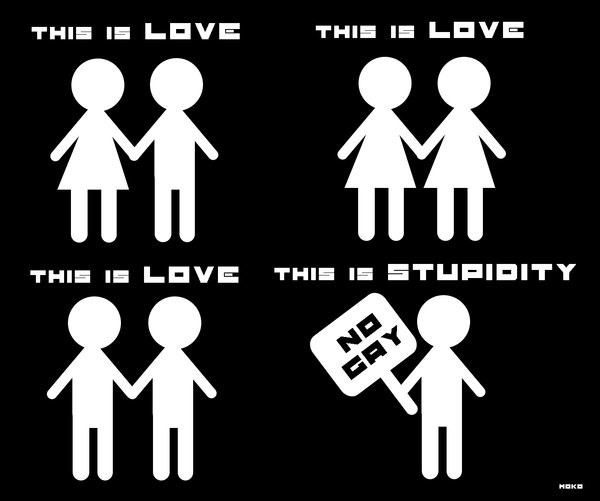There is an invisible minority in Bangladesh. They are generally underground and their opening up in public is uncommon. For homosexual communities, their sexual orientation makes them criminals in their own country. Besides not being able to exercise their rights, the LGBT community in Bangladesh [1] faces discrimination, verbal abuse, physical abuse and social challenges. The country does not recognize a marriage, civil union or domestic partnership between adults of the same sex.
Tanvir Alam [2] writes:
There is a British colonial law, penal code 377, which prohibits sexual relations between people of the same sex, claiming they are “against the order of nature”. The law has been repealed in the UK. While it is not enforced, it still exists in Bangladesh, and it is difficult to speak out in favour of human rights because of it. [..]
There is a culture of collective denial of the existence of the gay in Bangladesh – a fact attributable to social conservatism. Stigmatization and taboo have made the gay community, in particular, a vulnerable community. Unable to cope with social conditioning, they try to redefine a way of coherence.
This video [3] directed by Tanvir Alim and Arifur Rahman speaks on behalf of the Bangladeshi LGBT population who are almost invisible to the wider society. The interviews tell the story of their plights, belief, emotions and a silent resilience.
When Shawn Ahmed, a Bangladeshi-Canadian blogger, came out of the closet in a series of videos he got negative reactions from the family as documented here [4]. Tonmoy Hasan [5] expresses [bn] fear about his homosexuality in context of the conservative society:
বাংলাদেশের বয়স্ক সমকামীদের জীবন দেখে আমার করুণা হয়। তারা বিয়ে করেছে, তাদের বাচ্চাকাচ্চাও আছে। তারা তাদের অফিসের কিংবা বাসার অবসরটুকু কাজে লাগায় পার্টনার হান্টে। কেউ যদি ইন্টারেস্টেড হয় তাহলে তারা কোন হোটেলে এক ঘণ্টার জন্য রুম ভাড়া করে, সেক্স করে, তারপর যে যার পথে চলে যায়। তাদের অসহায়ত্ব দেখে আমি সিদ্ধান্ত নিয়েছি যদি আমার পুরো জীবনও একা থাকতে হয় তবে তাই সই। কিন্তু এভাবে প্রহসনের মাধ্যমে আমি কিছু মানুষের জীবন ধ্বংস করবো না।
I feel pity for the gay community in Bangladesh. Some are married, they have kids. They spend their leisure time in the hunt for sexual partners. If anybody is interested in them then they hire a room for one hour, have sex and go on to live their separate lives. Seeing all this I have decided if I have to be alone for the whole life (without marrying) so be it. I don't want to destroy some peoples’ lives.
Rainer Ebert [6] posts a number of case studies and writes about a young journalist:
Shakhawat felt romantically attracted towards men for as long as he can remember. Living apart from his family from an early age, he found support in Dhaka’s gay scene. He became a member of Boys of Bangladesh (BoB), a platform for gay men, and learned a great deal about the psychology and politics of sexual orientation. Shakhawat has been in a steady and committed relationship with another man for four years. He wants to stay in Bangladesh to raise awareness for LGB issues.
The internet has been an invaluable source of support and advice, and played a significant role in providing space for homosexuality in Bangladesh. A recent report [8] [bn] explains how homosexual men and women are resorting to different online communities for dating and finding partners. Boys Of Bangladesh [9], one of the pioneer online gay communities in Bangladesh, describes how the online communities evolved from IRC chatrooms, group mails, forums to Facebook pages. There are also English [10] and Bengali [11] blogs promoting news and views about LGBT rights.
Blogger Avijit Roy published a book in Bengali titled “Homosexuality, A Scientific and Socio-psychological Investigation [12]” and a number of chapters from that book have been published online in different blogs. This is the first book in Bengali to deal with LGBT people and their human rights. The book aims to remove the stereotyping and stigma about the LGBT communities in Bangladesh by explaining what homosexuality is and to address the issue from a human rights perspective.
Sabuzpatra [13] wants [bn] homosexuals in Bangladesh to be legally and socially accepted. The blogger thinks it will contribute in decreasing the growth rate in over-populous Bangladesh. The LGBT rights movement in Bangladesh is growing rapidly and the voices for decriminalization are becoming louder [14].
However bloggers like Darashiko [15] [bn] are against homosexuality and think people need to know about its negative aspects and the hatred against it should be kept alive.
Blogger Opobak [16] wonders [bn]:
সমকামী মানুষকে যদি আইনী অধিকার প্রদান করা হয় বাংলাদেশে তবে বাংলাদেশের সমাজে কতজন স্বাধীন ভাবে ঘোষণা করবে তারা সমকামী এবং এমন একজন কি পাওয়া যাবে যে এই অধিকার অক্ষুন্ন রাখবার জন্য আদালতে উপস্থিত হবে?
Even if there are legal recognition of homosexuals I wonder how many in Bangladesh can freely declare their orientation and would there be anybody to fight for their rights in the court?
